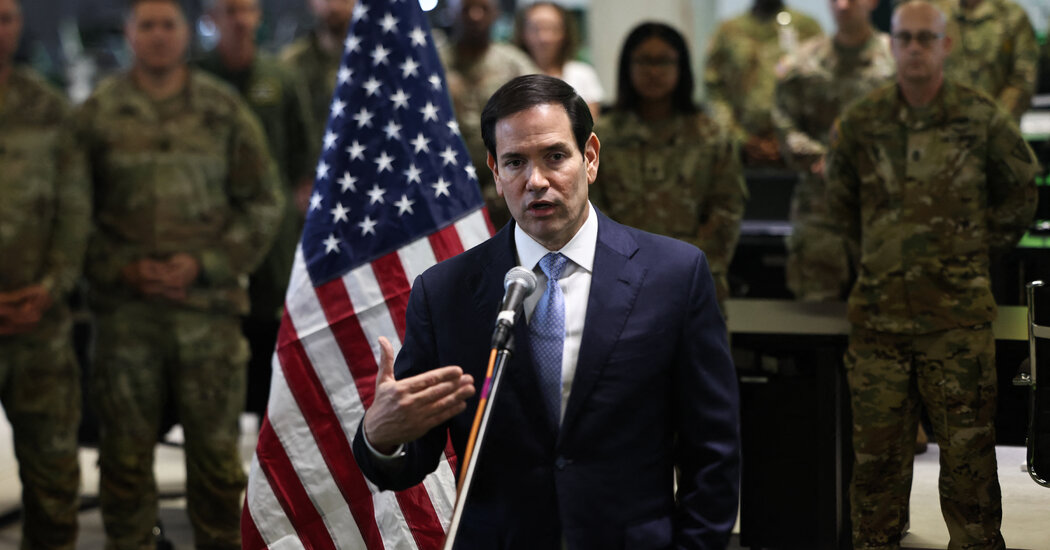Secretary of State Marco Rubio said Friday that a growing number of diplomats would work with American military officers at a new center in Israel aimed at monitoring the cease-fire in Gaza, as the Trump administration maintains pressure on Israel to stick to the deal.
Mr. Rubio made the remarks while touring the new facility, the Civil-Military Coordination Center, on Friday in Kiryat Gat, in southern Israel. It was the second visit by top administration officials to the center this week.
“There’s going to be ups and downs and twists and turns, but I think we have a lot of reason for healthy optimism about the progress that’s being made,” he said.
The State Department said later that Steven Fagin, a career diplomat who has served as ambassador to Yemen since 2022, would be the lead civilian official at the center.
Senior U.S. officials have been coming through Israel in a steady stream to indicate the importance of the cease-fire to Prime Minister Benjamin Netanyahu. President Trump and his aides remain concerned that the Israeli leader could dismantle the agreement.
The two-week-old truce has paused Israel’s devastating war in Gaza, which has killed tens of thousands of civilians and destroyed most of the territory. The war was ignited by the Hamas-led attack on Israel on Oct. 7, 2023.
The cease-fire has been tenuous, with occasional violence. Hamas has released 20 living hostages and the bodies of 15 deceased captives, and Israel has freed nearly 2,000 imprisoned Palestinians.
On Tuesday, Vice President JD Vance spoke at the center alongside Steve Witkoff, Mr. Trump’s Middle East envoy who helped negotiate the cease-fire, and Jared Kushner, the president’s son-in-law, who was also involved in brokering the deal.
The establishment of the center was announced on the same day by Admiral Brad Cooper, the head of U.S. military forces in the Middle East. He said it was intended “to support stabilization efforts” and that 200 U.S. troops had begun to put it together. The soldiers would not be deployed in Gaza, he added.
Before getting on a plane to fly to Tel Aviv on Wednesday, Mr. Rubio told reporters about the Trump administration’s plans for the center.
“We’ll be assigning some career-experienced State Department personnel to sort of be there to help coordinate all these efforts,” he said. “It’s important, and particularly over the next couple weeks, that we keep the cease-fire together.”
On Friday, he said that partner nations and nongovernmental groups would also provide expertise to the center, and he said the United States was willing to work with the United Nations on aid and other elements of the peace plan.
Mr. Rubio also reiterated that the Trump administration might seek a mandate from the United Nations for an international peacekeeping force in at least part of Gaza.
“It involves bringing together all the nation-states that are offering to provide personnel and resources,” he said, adding that the countries taking part would need to be ones “that Israel is comfortable with.”
Mr. Rubio declined to give details about how the force would be assembled or how it would operate. Arab states in the region are reluctant to send troops to Gaza, where their soldiers might come into direct conflict with Hamas.
The Trump administration has also pushed back against moves by Israeli politicians to annex the West Bank. On Wednesday, the Israeli Knesset, or Parliament, passed a largely symbolic motion led by far-right lawmakers in favor of taking over the occupied territory.
Mr. Trump said in an interview with Time magazine published after the vote that he would not allow Israel to annex the West Bank.
“We don’t think it’s going to happen,” Mr. Rubio said. He added that annexation would threaten the peace process in part because nations in the region would then refuse to take part.
Mr. Rubio met with Mr. Netanyahu at the prime minister’s office in Jerusalem soon after landing in Tel Aviv on Thursday evening.
Mr. Rubio said after the meeting that Mr. Trump had made enforcing the cease-fire a “top priority” and that “we’re going to get there despite substantial obstacles.” The United States is by far the largest provider of military aid to Israel, and the president has approved substantial weapon packages to the country since taking office in January.
Mr. Rubio said he planned to join Mr. Trump in Qatar to fly to Asia this weekend for leadership summits in Malaysia and South Korea, and a visit to Japan in between those stops.
Edward Wong reports on global affairs, U.S. foreign policy and the State Department for The Times.
The post U.S. Diplomats Will Work With Troops to Maintain Gaza Cease-Fire, Rubio Says appeared first on New York Times.




